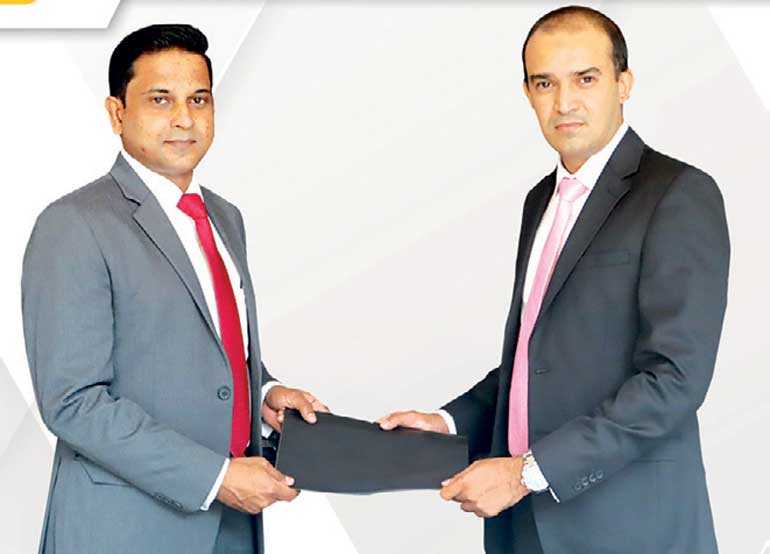Tuesday Feb 24, 2026
Tuesday Feb 24, 2026
Tuesday, 27 October 2020 01:50 - - {{hitsCtrl.values.hits}}

Bristol Institute COO Dilshad Jiffry (right) with Results Training CEO Faraz Farook
Bristol Institute of Management, best known for its visionary thinking, has in an innovative move added experiential leaning to its MBA program, making it the first in the market to do so.
Bristol Institute COO Dilshad Jiffry stated: “Companies today should ideally have an effective well-designed leadership skill development program on decision-making for managing challenging market situations. These should cover aspects such as communication, thinking and acting systematically, influence, self-awareness, resilience and agility. Such insights, will gear those in leadership positions to adapt and be ready to identify problems and craft effective solutions and successfully navigate their companies through volatile market conditions.”
As such, Bristol institute of Management has taken the lead in equipping its MBA team of graduates comprising many middle management personnel from top blue chip companies and conglomerates, to get equipped with such skills so that they in turn can drive better results for the organisations they serve.
Bristol recently signed up with Results Training, a company specialised in helping organisations and industries transform their human potential through experiential learning.
The leadership programs will focus on activities that include managing teams, ice-breakers, cooperative game sequence, goal setting, taking ownership and accountability and displaying leadership skills followed by certain psychometric assessments.
Feedback sessions are conducted through effective debriefing at the end of each activity. An evaluation is done both by the participants and their peers, that prompts leaders to assess their strengths and areas of improvement.
This form of experiential learning will help participants recognise their loopholes and become aware of their natural style of leadership through self-awareness exercises.
Jiffry explained: “When the learning process is structured based on the science of experiential learning, the participants acquire knowledge by analysing and reflecting on their experiences after accomplishing an assigned task. In fact, the cycle starts from experiencing, then moving on to learning from the experience, reflecting on the learnings and transferring the knowledge to their workplace.”
He added: “The training programs we have designed with Results Training will help middle management to introspect, re-identify and assess the skill gap and up-skill to suit the current times and be agile-ready to perform beyond the boundaries and cope-up with the present challenges. They will gain the understanding to identify the ‘real’ persona in others and be enabled to identify the strengths, weaknesses of their co-workers, subordinates and other stakeholders involved in their organisational growth.”
Results Training CEO Faraz Farook speaking of the program affirmed: “The strength of leadership is tested at the times of crisis and uncertainty. Leaders need at such times to have a clear mind and be present in the ground situation, to wholly observe what has caused the damage, how it can be rebuilt from scratch if necessary and look ahead while seeing the bigger picture in a situation. They need to look for new opportunities in the market even at times of a downfall. As employees always look up to the head of the organisation, true inspiration should spark from the leader to ignite the entire team. When the confidence is boosted amongst the employees, the right mindset will be employed. It is also important to bring out the ‘can do’ culture even when things aren’t merry, so it is important for the leader to become the source of motivation. This is what we try to inculcate through this training.”
With a reputation for harnessing creativity and out of the box thinking, Bristol Institute of Management has set a new trend in the market through this initiative that promises to help participants of their MBA program achieve a new level of leadership skills and transform their capabilities to help achieve organisational growth during challenged times .